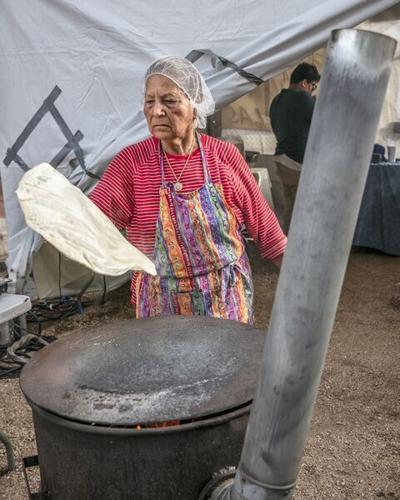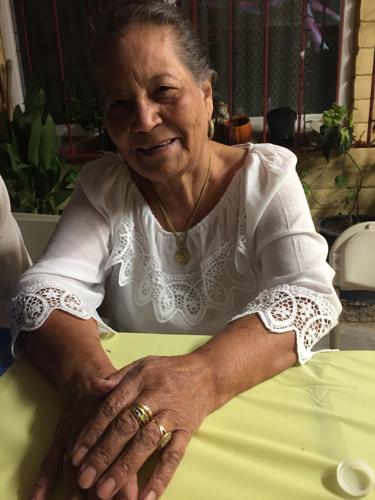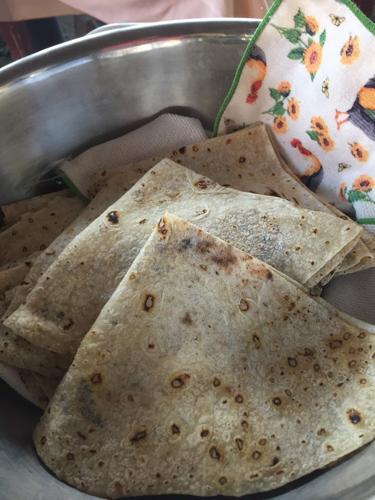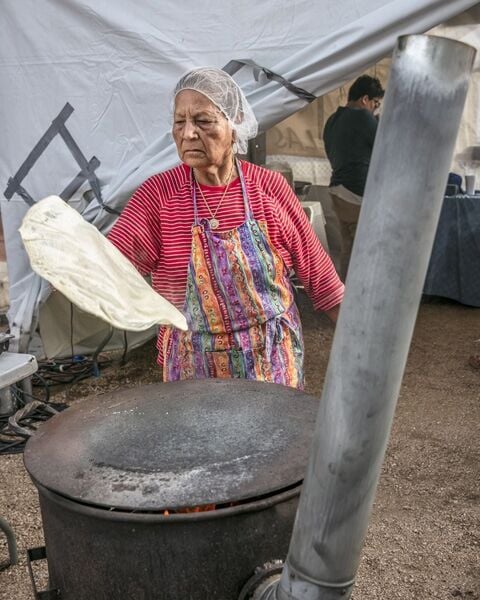Iтm not going to tell you where the house is. When you drive there, youтll pass a fenced-in trampoline, and the kids might stop jumping to peer at the car disrupting the early evening. There arenтt any sidewalks, but older couples and cliques of teens are ambling in the monsoon-swept street. The charm of this neighborhood is resistant even to Google Maps. Plug in the address, and the app will take you in circles before you finally park and count the numbers on the houses in a line.
Many cars are pulled into few spaces: under a door-less garage, in the part of the lawn outside the gate, parallel-parked against a curb barely longer than the SUV. This is because many people come here т friends, neighbors, extended family, even a lucky journalist, or the University of УлшжжБВЅ professor who came across Matilde Santa Cruz as Matilde made tortillas at her sisterтs fruit stand almost two decades ago.
Visitors might be dropping by to share some coffee, boiled atop a mesquite-burning stove, or to help Matilde chop the wood she uses to cook almost everything, it seems. Neighborhood kids gather here, too, because her grandchildren and great-grandchildren bring them to ride bikes or play with a gray-and-white striped kitten.
But mostly people come for the food. Matilde Santa Cruz is famous for demonstrating how to make tortillas by hand, over a mesquite-fired slab of cast iron, at УлшжжБВЅ Meet Yourself т something she has done for the past 18 years.
УлшжжБВЅ Meet Yourself takes over JУЁcome Plaza this weekend, Oct. 8-10. Itтs a smaller festival than usual due to the pandemic, but youтll still be able to enjoy УлшжжБВЅтs beautiful blend of cultures through its music, art and food т including Matildeтs tortilla demonstrations.

Matilde Santa Cruz at her home in УлшжжБВЅ.
At home, Matilde always has food to share, whether itтs beans on the stove and freshly-made tortillas, or something elaborate and invariably made from scratch.
Last week at our interview, she was making green chile tamales, and her grandson was in the side yard, grinding the kernels into masa. тThe correct ratio is five pounds masa to one pound lard,т Matilde Santa Cruz, Matildeтs daughter, said.
When I peeled open the green corn husk (it had been stripped from the grain mere hours earlier), the masa was wet and still a little loose from the steaming process. Its texture was fluffier than anything I remember eating, with a perfectly chewy sinew of chile verde running through it like a spine, latticed with melted cheddar. Matilde did not take out the seeds, and the tamale was the kind of spicy that takes up joyful, abundant space in your mouth.
I was sitting at a long table, tucked efficiently between the door to Matildeтs bedroom and the entrance, directly across from two couches facing each other in the formal living room. Portraits of her family hang on every wall. Above me, there are lines of picture-boxes of her parents, aunts, uncles т тMy family before marriage,т she said. Above the couches, itтs her family after marriage т her kids, grandkids, great-grandkids, nieces, nephews, sisters, in-laws. Several of these figures are in her home right now: her daughter, her son, her great-granddaughter, her grandson. More, however, are dead.
Matilde herself is a survivor. She will stop her chemo pills in a month, after 10 years of treatment and recovery from breast cancer. тShe found out in October 2011, on the last day of УлшжжБВЅ Meet Yourself,т her daughter said. тShe held it in all day, until we were eating around a table at home, exhausted, and shared her news.т Her hair is thin and pulled back into an elegant twist. She stands with the posture of someone who once owned lots of property, which her family did in Sonora.
тWhen she was young, weтd get up at four every morning to milk the cows, then come back and go to school. Sheтd help cook and then do homework,т her daughter said. Matilde started learning how to make tortillas when she was 8 years old. By the time she was a teenager, she was making them for the family, then attending her fatherтs business deals.
тSheтs always been a whiz at math. Her dad would take her with so she could calculate the sale price of produce. Buyers would try to say that she was wrong, just a little girl, but she could always prove to them that she calculated correctly,т her daughter said.

Matilde prepares food year-round for her clients, who hire her to cater events and make meals for the holidays.
The food that they made on the ranch when Matilde was a child used every part of the cow. Theyтd pick one from the herd to feed properly. When they slaughtered it, every piece was put to use. I realize belatedly this is probably the origin of menudo, a soup delicious enough to make tripe taste like a gift. They didnтt have any grocery stores, so everything they ate they made, preserved, or traded for within their farming community.
тShe took me back there as a child and showed me where she hid the sugar cane before it was made into sugar, and the cave where they stored all the food during the winter,т her daughter said. While Matilde no longer grows her own food (other than a vine of green beans she keeps near her garage), she still processes and stores it like she grew up doing.
Her two wood-fired stoves are often used simultaneously, one roasting the chiles verdes while the other is cooking tortillas made by hand. Anything that can be grinded at home goes through her hand-cranked machine: from coffee beans purchased green and sun-dried, to raw corn off the cob.
This way of life seems impossibly distant as you read her story on a small computer. But in Matildeтs backyard, a middle-aged man -т itтs ambiguous whether heтs a relative or a friend т is chopping the firewood she will use for the tortilla demonstration this week at УлшжжБВЅ Meet Yourself. Her grandson sometimes gets sent to his neighborhood school smelling like mesquite smoke and fresh tortillas, with one in his packed lunch and another to share with the teacher.
Her side yard has a bar and an outdoor table for company on each side of two wood-burning stoves (one is centuries-old and made of cast-iron, the other is a high-walled brick fire pit).
тOut here, weтve laughed, weтve cried, fought, danced, gotten engaged,т Matildeтs daughter said. тSheтs been in this house for 55 years. Iтll be sitting here on the swing drinking coffee and talking with my mom, and all of a sudden there will be 10 people gathered around her as sheтs clapping tortillas.т
тDuring COVID, no one would be coming over. She said, тLetтs put some wood on the stove and make coffee outside.т And Iтd come over and it was quiet,т her daughter said. The kitten is sitting underneath Matildeтs chair, and they both are looking inquisitively at the trio of schoolkids running around outside of my line of sight. She catches me looking at her and gamely smiles across our language barrier. She can speak more English than I can Spanish, but her daughter has mostly been translating. When her daughter translates a joke, I make sure to look at Matilde when Iтm laughing, and she grins back.

Matilde's flour tortillas are made by hand and cooked over mesquite flame.
Matilde is the kind of grandmother who doesnтt let go of the traditions she grew up with. When she was a young woman, she would travel freely between УлшжжБВЅ т where her married sisters lived т and Sonora т where she still lived with her family т aided by a passport. Eventually, though, the porous border was sealed, and she ended up on this side of it, making tortillas at her sisterтs fruit stand, which is now a Walgreens parking lot.
Eighteen years ago, a professor and organizer of УлшжжБВЅ Meet Yourself spotted Matilde at the fruit stand, and asked her if sheтd like to be a part of the event. Over the decades, these organizers have become a part of Matildeтs family. She knows what kinds of foods their spouses like. The year she turned 80, she hosted a huge potluck where she was the only one bringing food. She told everyone to invite their loved ones and she cooked for them all, with live music and everything.
When Maribel Alvarez т the program director of УлшжжБВЅ Meet Yourself т first shared Matildeтs daughterтs phone number with me, I simply thought she was connecting me with a food vendor at the event, albeit a special one. Then she sent me some pictures she had taken over the years, and I realized that perhaps they were more closely connected than I realized.
In the portrait Maribel took, Matilde is wearing a spotless white blouse with large webs of lace at the ends of three-quarter sleeves and around the collar. She looks like a grandmother and a saint, hairline parallel to regal cheekbones. You can tell by the proportion of her hands in the picture that the photographer was close enough to Matilde to touch her. You can also tell from her soft smile, reserved from the camera, not the friend.
When Maribel was telling me about УлшжжБВЅ Meet Yourself, she said it was like a classroom. This is perhaps a metaphor only an educator would use, who reveres the setting beyond the claustrophobic experience most of us share as children. No, to Maribel, this is where knowledge is exchanged in the most organic way imaginable, as you watch Matilde meter out lard by hand, salt by the pinch, to understand the way tortilla dough should feel at each step of its creation.
This backyard, then, is the first classroom. It was 55 years ago, when Matilde was raising her only daughter, who she named after herself. And 10 years ago, the first holiday season she was on chemo, that daughter had to haul gallons of masa over to Matilde's bedside to get feedback and approval for hundreds of dozens of tamales. Hundreds of familiesт Christmas dinners.
тI grew up wearing puffy dresses with a flower in my hair. Aprons,т her daughter said, now wearing a Diamondbacks t-shirt and cutoff jeans. тNow Iтve accepted that our tradition is beautiful. Not everyone has carried it on.
тPeople tell me, тYou can dress up however you want, but the Mexican in you stands out,тт she said. Her hair is tied into a twist, like her motherтs.
If you go
What: УлшжжБВЅ Meet Yourself
When: Friday-Saturday, Oct. 8-9, 11 a.m. to 10 p.m. | Sunday, Oct. 10, 11 a.m. to 6 p.m.
Where: JУЁcome Plaza, 101 N. Stone Ave.
COVID-19 info: TMY is an outdoor event, which can be safely produced according to CDC and WHO guidelines.
In order to follow the highest standard of those guidelines, organizers and vendors have worked together to reduce the density of the event ~40% from pre-COVID years. They encourage social distancing with rope walkways and signage, as well as social distance blocking in front of performance stages. Four parking spots will be available to accommodate take-out of food items.
Maribel encourages you to check out their and plan your visit efficiently, to get as much out of the event in as little time as possible.
For more information and to see a full list of vendors, visit





